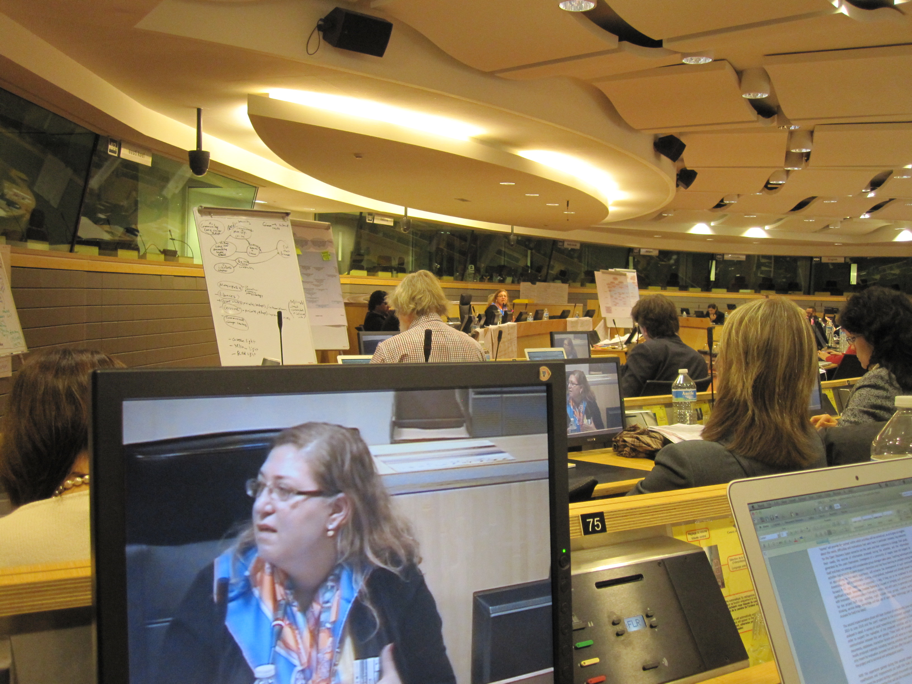European Forum on Learning Futures and Innovation
"A good education system should provide all who want to learn with access to available resources at any time in their lives."
Illich, 1971
Committee des Regions | Brussels
Organised by the VISIR, TELMAP, ODS projects with the support of the European Commission (DG CONNECT and DG EAC) and the Committee of Regions.
This was a two day event, aiming at:
- Mainstreaming existing e-learning grassroots innovation practices, increasing awareness about opportunities for community building and roadmapping;
- Discussing and sharing e-learning perspectives and visions to foster innovation management, scalability and mainstreaming;
- Providing intelligence in order to alert and inform e-learning stakeholders about developments, and trends that can affect their future plans.
European Forum on Learning Futures and Innovation
During two days, more than 130 experts, practitioners, decision makers from TEL, a great number from European countries, joined to find ways to mainstream existing e-learning grassroots innovation practices, increasing awareness about opportunities for community building and roadmapping.
A number of e-learning perspectives and visions to foster innovation management, scalability and mainstreaming were shared and discussed.
The first day of the event focused on issues of scalability and mainstreaming through highlighting the results of existing European projects; the second day of the event addressed sector-based strategies and innovation workshops.
The event was organised through a first day of Unconference-type discussion and dissemination and a second day of sector-based strategy and innovation. An a second day sector-based strategy and innovation workshops.
«The "idea of a European learning innovation cartography" was discussed during the event, bringing the agreement to build a "living map of innovation" of TEL in Europe.»

Vana Kamtsiou
European Forum on Learning Futures and Innovation
http://www.learningfrontiers.eu/
Vana Kamtsiou opened the Unconference and in her speech described the context behind the driving question of the event: "Why has mainstreaming been so difficult?"
The three projects that organized the event presented their way towards scalablity: VISIR, TEL-Map, ODS.
Fabio Nascimbeni
European Forum on Learning Futures and Innovation
https://fbcdn-sphotos-g-a.akamaihd.net/
The VISIR project was presented by Fabio Nascimbeni. The project aims to close three important e-learning gaps (understanding, networking, mainstreaming) featuring connecting bottom-up grassroots micro-innovation practices.
VISIR has mapped more than 120 working practices on the use of ICT in different learning areas.
One if these working practices, my micro-innovation practice Lugares & Aprendizagens (ICT & Languages, e-learning) informal learning & Secondary Education (2002).
European Forum on Learning Futures and Innovation
Round-table "Towards an e-learning innovation cartography" joined Claudio Dondi (VISIR), Paul Lefrere (TEL-Me), Daniel Burgos (HoTEl), Nikolas Athanisiadi (ODS), Lieve Van den Brand (EU). Read the report here
Key-note speach "Scaling-up ICT-enabled innovation for learning: Insights from European and Asian Education Innovations" was given by Yves Punie (IPTS). Read more here
VISIR | ICT for Learning in Europe
The 19th March, three parallel sessions were organized. I was invited by Fabio Nascimbeni (VISIR) to lead with Giordano Koch and Jan Pawlowsky the Workshop 3: "Bridging formal to informal learning: cases of grassroots innovation towards scalability".
My presentation "Attractive Learning at a Digital Age: bridging formal to informal learning in Secondary Education."
Really liked to participate at the VISIR workshop. I am honored to have been invited by Fabio Nascimbeni. He believed in my expertise. Wonderful experience! Great responsibility. At the end, I was very happy! Participants followed me with much interest and attention and they congratulated me with the warmest and kind words.
Giordano Kosch was a great colleague. Jan Pawlowsky was very snob. Sometimes, college professors, not all, thanks God! don't understand that who prepared the new "wired-gen" who attend now Higher Education were the educators in Secondary Education. Students are prepared to online learning because we practice it in school.
European Forum on Learning Futures and Innovation
Finally the Plenary Conclusions: "What we have learnt? Next steps for the e-learning innovation cartography". Read the conclusions on the final report here
A fantastic and instructive Seminar ! The European Forum on Learning Futures and Innovation was an excellent opportunity for an interactive and personalized participation.
New ideas and exchanging visions about TEL in Europe.
Thank you VISIR!
G-Souto
26.03.2013
Copyright © 2013G-Souto'sBlog, gsouto-digitalteacher.blogspot.com®

















